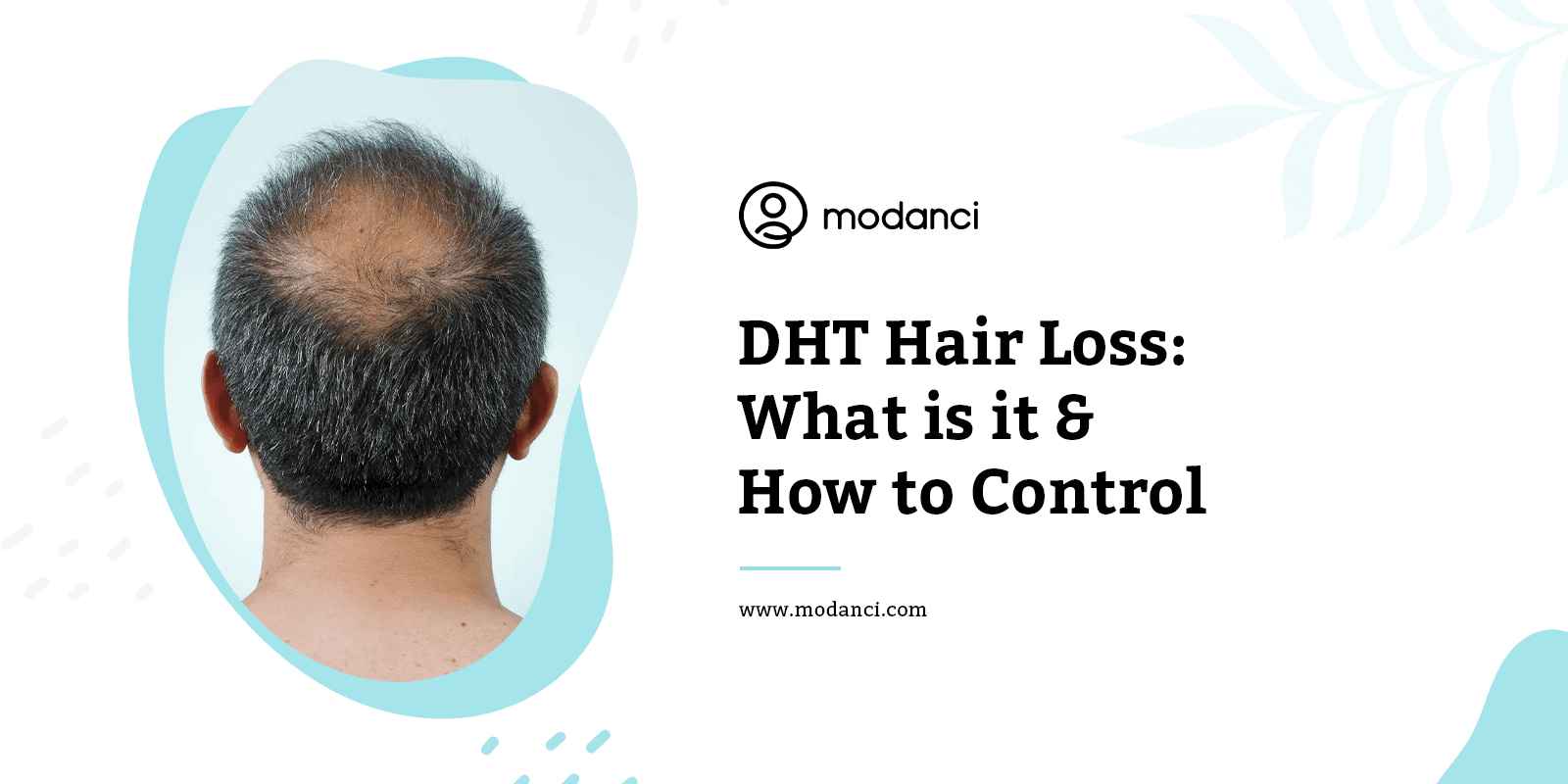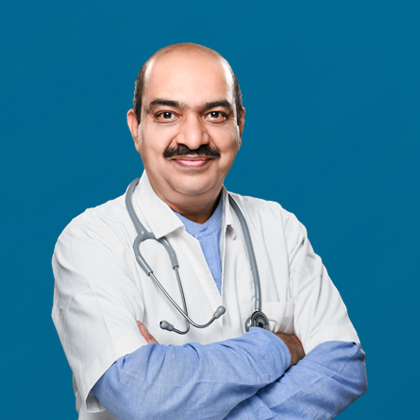Hair loss is common for both men and women, and its impact on our lives can be significant. While males commonly experience hair loss at some stage, women may also encounter varying degrees of hair loss. Our bodies house steroids and hormones, including dihydrotestosterone (DHT), which plays a crucial role in hair loss.
Elevated levels of DHT can impede hair growth and lead to substantial hair thinning. To effectively address hair loss, it is essential to comprehend how DHT causes hair loss and affects hair thinning and strategies to control its impact.
What is DHT?
DHT, short for dihydrotestosterone, is a hormone derived from testosterone through the action of an enzyme called 5-alpha-reductase. DHT is responsible for the growth of facial and body hair, the deepening of the voice, and the development of the male reproductive system during puberty. It is a potent androgen crucial in developing and regulating male characteristics.
DHT can also have adverse effects on the body, particularly on the hair follicles. In individuals predisposed to hair loss, DHT can bind receptors in the scalp, leading to miniaturisation, resulting in progressively finer and shorter hair. Eventually, the affected hair follicles may stop producing new hair, leading to hair thinning and baldness.
What Happens in High DHT?
Elevated levels of DHT (dihydrotestosterone) can significantly affect the body. DHT binds to hair follicle receptors, causing them to shrink and produce thinner hair strands. High DHT levels are strongly associated with androgenetic alopecia, commonly known as male-pattern baldness or female-pattern hair loss.
Additionally, DHT can stimulate the sebaceous glands in the skin, resulting in increased oil production and a higher likelihood of acne breakouts. This is particularly prevalent during puberty, when DHT levels naturally surge.
Apart from hair-related effects, elevated DHT levels can also impact other body areas. DHT plays a role in the growth and development of the prostate gland, and excessive DHT can contribute to prostate enlargement, leading to symptoms such as frequent urination and difficulty emptying the bladder. Furthermore, while high DHT levels can cause hair loss on the scalp, they can paradoxically stimulate hair growth in other regions like the face and body, resulting in increased facial and body hair in individuals with high DHT levels.
How Does DHT Cause Hair Loss?
DHT (dihydrotestosterone) is a hormone derived from testosterone that plays a significant role in hair loss. When testosterone interacts with the enzyme 5-alpha-reductase, it is converted into DHT. While DHT is important for various bodily functions, excessive levels of DHT can lead to hair loss.
DHT affects hair follicles by binding to specific receptors in the scalp. This binding process triggers a series of biological responses resulting in hair miniaturisation. The hair follicles become smaller and thinner, with weaker strands each growth cycle. Over time, the follicles cannot sustain average hair growth, leading to progressive hair thinning and eventual loss.
Some pointers to consider:
- DHT binds to hair follicle receptors, causing them to shrink and produce thinner hair strands.
- Hair miniaturisation occurs due to DHT’s effects on the hair follicles.
- DHT-induced hair loss is typically associated with androgenetic alopecia or pattern baldness.
- Excessive DHT levels can disrupt the natural hair growth cycle, leading to progressive hair thinning.
- DHT primarily affects the hair follicles on the scalp while stimulating hair growth in other areas of the body, such as the face and body.
What are Some Natural Ways to Prevent DHT From Causing Hair Loss?
Six of these items are given below, along with the data confirming each food’s possible impact on DHT concentrations and male pattern baldness.
1. Balanced Diet
A nutrient-rich diet can help regulate DHT levels and promote healthy hair growth. Include foods rich in antioxidants, vitamins and omega (especially vitamin B7 and Biotin), minerals (such as zinc and iron), and omega-3 fatty acids. Green leafy vegetables, nuts, seeds, fish, eggs, and fruits are excellent additions to your diet.
2. Scalp Massage
Regular scalp massages can increase blood circulation to the hair follicles, nourishing them and reducing the effects of DHT. Use your fingertips to gently massage the scalp in circular motions for a few minutes daily. For added benefits, you can also use essential oils like rosemary, lavender, or peppermint.
3. Herbal Supplements
Certain herbs, such as pygeum, and pumpkin seed oil, are believed to inhibit the conversion of testosterone to DHT. These herbal supplements may help reduce DHT levels and prevent hair loss. However, consulting an Ayurvedic vaidya before starting any new supplement regimen is essential.
4. Stress Management
Chronic stress can increase DHT production, leading to hair loss. Stress-reducing activities like yoga, meditation, and deep breathing exercises can help manage stress levels and potentially reduce DHT-related hair loss.
5. Regular Exercise
Exercise promotes overall health and can help balance hormone levels, including DHT. Regular physical activity boosts blood circulation, which can improve hair follicle health and reduce the effects of DHT on the hair.
6. Natural DHT Blockers
Some natural ingredients, such as green tea, pygeum bark, are believed to have DHT-blocking properties. Incorporating these ingredients into your hair care routine through homemade remedies or commercially available products may help prevent DHT-related hair loss.
Conclusion
In conclusion, controlling DHT (dihydrotestosterone) levels is crucial for preventing hair loss. Adopting a balanced diet, practising scalp massages, using herbal supplements, managing stress, exercising regularly, and incorporating natural DHT blockers can help maintain healthy hair and minimise the impact of DHT-related hair loss. These steps empower individuals to preserve their hair and promote overall health.
Modanci’s Potensified Ayurvedic Solution For Hair Growth And Maintenance can help support your hair and scalp health. This package includes a Handcrafted Organic Jatamansi Kokum Shampoo Conditioner Bar, an Ayurvedic Hair Oil, Hair Tablets, and Nasya Oil. Fill out some information and answer a few questions to discover personalised Ayurvedic solutions for your hair and scalp health!
FAQs
1. Can you regrow hair loss from DHT?
Regrowing hair loss caused by DHT (dihydrotestosterone) can be challenging, but it is possible to slow down the process and stimulate regrowth with the right approach. Adapting to a healthy lifestyle, managing stress, and maintaining a nutrient-rich diet, individuals may experience improvements in hair growth and potentially regrow lost hair.
2. How can I reduce DHT in my Hair?
Six foods that could prevent DHT and prevent hair loss are green tea, coconut oil, coconut meat or kernels which coconut oil is derived from, onions (and other quercetin-rich foods), curcumin pumpkin seeds, and edamame.
3. What causes DHT to increase?
When their ovaries overproduce androgens like testosterone, the result is an increase in DHT levels. This causes many symptoms, including irregular periods, hirsutism, excessive hair growth, and acne.
4. What increases DHT hair loss?
Male pattern hair loss (androgenic alopecia), prostate cancer, benign prostatic hyperplasia (BPH), and excessive male-pattern hair growth in females (hirsutism) are all disorders that can increase DHT (dihydrotestosterone). High levels of DHT can cause hair loss because they shrink your hair follicles and decrease the hair development cycle. Along with other factors, such as genetic ones, increased DHT activity in your Hair follicles contributes to this hair loss.
Read More:




